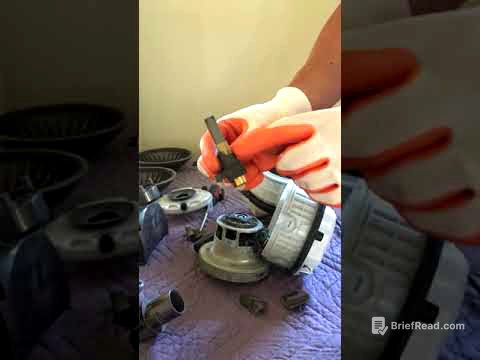TLDR;
This video provides five doctor-approved methods to reduce nighttime urination for people over 60. It emphasizes that the issue often stems from hydration habits, medication timing, bedroom environment, and meal timing, rather than just bladder problems. The methods include following the 246 hydration rule, adjusting medication timing, optimizing bedroom temperature, eating dinner earlier, and using a kitchen timer to regulate fluid intake.
- The 246 hydration rule involves drinking two glasses of water before 10:00 a.m., four glasses between 10:00 a.m. and 4:00 p.m., and limiting intake to a maximum of 6 oz after 6:00 p.m.
- Adjusting the timing of medications, especially blood pressure pills, from evening to morning can significantly reduce nighttime urination.
- Maintaining a bedroom temperature between 68-72°F can relax bladder muscles and reduce false urgency signals.
- Eating dinner at least 3 hours before bedtime allows the digestive system to process food while upright, preventing a "traffic jam" in the body's fluid processing system during sleep.
- Combining all the methods with a kitchen timer to regulate fluid intake at specific times can lead to significant improvements in sleep and overall health.
The 246 Hydration Rule [1:28]
Urologists recommend the 246 hydration rule to manage fluid intake effectively. This rule suggests drinking two glasses of water before 10:00 a.m., when the kidneys are most active. Then, consume four glasses between 10:00 a.m. and 4:00 p.m., spreading them evenly throughout this window. After 6:00 p.m., limit yourself to a maximum of 6 oz of water. It's important to sip water consistently during the designated times rather than chugging large amounts sporadically. This approach works with the body's natural circadian rhythm, where the kidneys are most active in the morning and slow down at night.
Medication Timing [3:47]
Many seniors take medications that increase urination, often at the worst possible time. 65% of seniors take medications that increase urination, and most are taking them at the worst possible time. Common culprits include ACE inhibitors, diuretics, and beta blockers. Taking these medications with dinner or before bed programs the body to produce more urine right when you want to sleep. Switching the timing of blood pressure medication from evening to morning can significantly reduce nighttime urination. It's crucial to consult a doctor before changing medication timing, but morning dosing can be a game-changer for nighttime sleep.
Bedroom Environment [6:21]
Room temperature affects bladder capacity by up to 40%. The optimal bedroom temperature for reducing nighttime urination is between 68-72°F. At this temperature range, bladder muscles remain relaxed, and the body doesn't work overtime to regulate temperature, reducing false urgency signals. A 30-second test involves noticing if you feel the urge to urinate more when you first lie down under warm blankets, indicating that temperature might be triggering unnecessary bathroom trips. Maintaining a cooler bedroom temperature also promotes deeper sleep phases, which naturally reduces the brain's sensitivity to bladder signals that aren't truly urgent.
Meal Timing [9:18]
When you eat within 3 hours of bedtime, your body diverts blood flow and energy to digestion, affecting how efficiently your kidneys process fluids throughout the night. Late eating creates a traffic jam in your body's fluid processing system. The 3-hour rule suggests finishing your last meal at least 3 hours before bedtime. Eating earlier allows the body to enter true restorative sleep instead of working on digestion all night. Distinguishing between true hunger and habit-based eating can also help reduce late-night snacking.
Kitchen Timer Technique [12:51]
Combining all the methods with a simple kitchen timer can create a powerful system for reducing nighttime urination. The timer technique involves setting alarms to regulate fluid intake at specific times throughout the day. From 7:00 a.m. to 10:00 a.m., set the timer to go off every hour and drink 8 ounces of water. From 10:00 a.m. to 4:00 p.m., reset the timer for every 90 minutes and drink 6-8 ounces of water. From 4:00 p.m. to 6:00 p.m., limit yourself to two final timer alerts, with 6:00 p.m. being the absolute cutoff. After 6:00 p.m., only allow tiny sips if absolutely necessary. Combining the timer technique with medication timing, bedroom temperature, and meal timing can lead to significant improvements in sleep and overall health.









